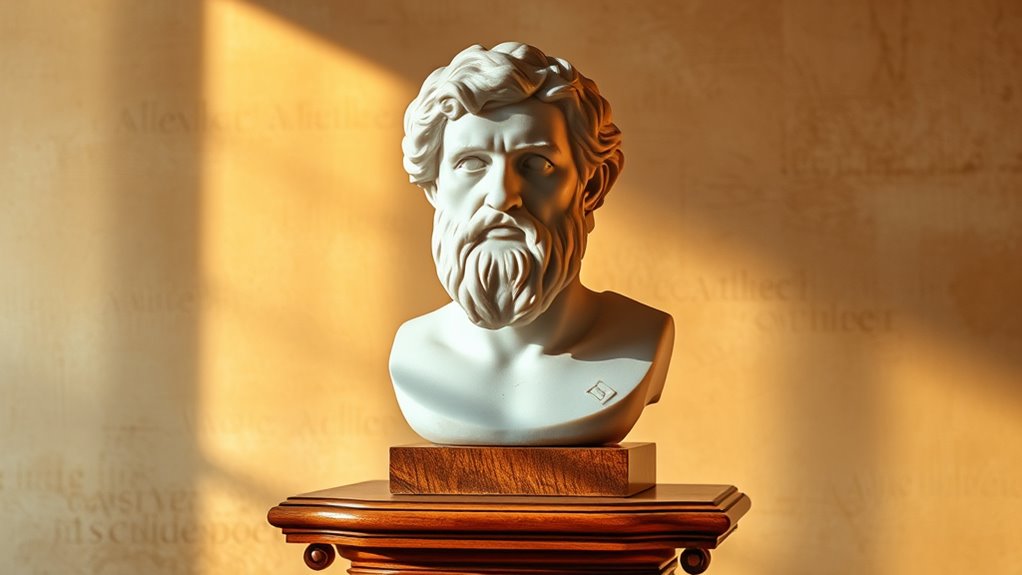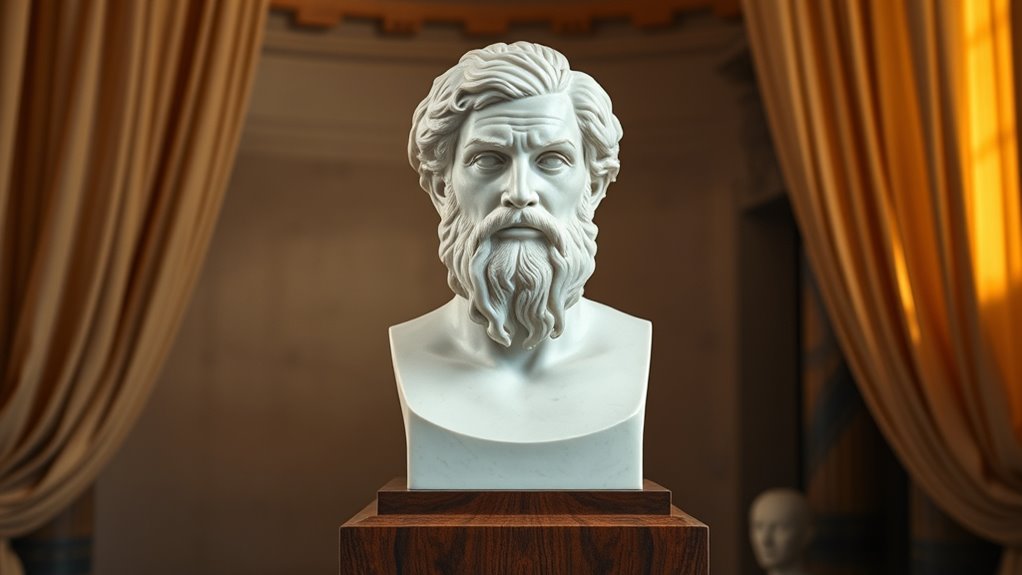Plato teaches that true education elevates your soul by nurturing virtues and awakening innate knowledge of eternal truths. It’s about more than facts — it’s a spiritual journey that helps you connect with higher ideals and perfect forms. Education guides you toward moral excellence and inner harmony, revealing the unchanging realities behind appearances. If you want to explore how this process transforms your inner life and brings you closer to wisdom, there’s more to discover.
Key Takeaways
- Plato views education as a spiritual journey that nurtures the soul and guides it towards higher virtues and truth.
- True education involves recollecting innate knowledge of eternal forms and moral ideals.
- The beauty of education lies in its power to transform the inner self and align it with higher realities.
- Education helps develop virtues like justice and beauty by internalizing these ideals within the soul.
- Ultimately, Plato sees education as a sacred process leading to the soul’s enlightenment and moral perfection.

Have you ever wondered how education shapes the soul? Plato believed that true education isn’t just about acquiring facts or skills; it’s about nurturing the very essence of who you are. At its core, education is a journey of virtue development and knowledge pursuit, guiding you toward becoming a more virtuous and enlightened individual. He saw the soul as something that can be perfected through the right kind of learning, one that aligns with the deeper truths of existence. When you engage in education with this mindset, you’re not merely filling your mind with information — you’re cultivating qualities like wisdom, temperance, and justice that elevate your character.
According to Plato, the pursuit of knowledge is intertwined with virtue development. It’s not enough to simply know things; you must understand them in a way that transforms your inner self. Knowledge, in his view, is a means to achieve harmony within the soul, allowing your rational part to govern your appetitive and spirited parts. This harmony leads to the development of virtues that guide your actions and decisions. For instance, learning about justice isn’t just about memorizing rules; it’s about internalizing a sense of fairness that influences your behavior in everyday life. As you deepen your understanding, you become more conscious of your motives and endeavor to align your actions with higher values. Education, thus, becomes a process of shaping your inner character, guiding you toward moral excellence. Additionally, understanding the concept of the forms helps you recognize the eternal and unchanging truths that underpin moral and aesthetic ideals.
Plato also emphasized that true education is a form of recollection — it helps you remember truths that your soul knew before incarnating in your current body. This idea underscores that the pursuit of knowledge is an ongoing quest to rediscover your innate understanding of the forms, the perfect ideals that underpin reality. When you seek knowledge, you’re not just collecting superficial facts; you’re awakening your soul to its true nature. This awakening fosters virtue, because living in accordance with higher truths naturally cultivates moral excellence. Education, in this sense, becomes a transformative process that elevates your soul, aligning it with the eternal forms and guiding you toward your true purpose.
Ultimately, Plato’s vision of education is deeply spiritual. It’s about awakening your inner potential through the pursuit of knowledge and virtue development. When you approach learning with this perspective, you’re not just preparing for a career or passing exams — you’re shaping your soul into its most perfect form. Education becomes a sacred journey, one that leads you toward wisdom, moral integrity, and the realization of your highest self. In this way, Plato shows that the true beauty of education lies in its power to transform your inner life and elevate your entire being.
Frequently Asked Questions
How Does Plato Define the Concept of Beauty in Education?
Plato sees beauty in education as achieving aesthetic harmony and moral virtue. You experience this beauty when learning aligns your soul with higher truths, cultivating inner harmony and moral goodness. It’s about the soul’s ascent, where education nurtures moral virtue and creates a sense of aesthetic harmony within. This harmony reflects the true beauty in education, guiding you toward wisdom and a well-ordered soul.
What Role Does the Soul Play in Plato’s Educational Philosophy?
You might think the soul’s significance is just poetic, but in Plato’s view, it’s central to educational transformation. Your soul seeks truth and harmony, guiding your growth beyond mere facts. Education isn’t just about acquiring knowledge; it’s about nurturing the soul’s innate goodness. By engaging with the true, beautiful, and just, you transform yourself, aligning with your higher nature and realizing your fullest potential.
How Can Modern Education Incorporate Plato’s Ideas on the Soul?
You can incorporate Plato’s ideas on the soul by emphasizing artistic expression and moral development in education. Encourage students to explore creativity, fostering their inner selves and moral understanding. Incorporate activities that challenge their ethical reasoning and promote self-awareness. By doing so, you help students nurture their soul, aligning education with personal growth and moral virtue, just as Plato envisioned a harmonious development of both mind and spirit.
What Are the Practical Implications of Plato’s View on Beauty in Learning?
You might think beauty is superficial, but embracing Plato’s view reveals that visual harmony and aesthetic engagement in learning deepen your understanding and inspire your soul. By designing lessons and environments that celebrate beauty, you foster curiosity and emotional connection. This practical approach transforms education into a soulful journey, helping you see knowledge as more than facts—it’s a pursuit of harmony that elevates both mind and spirit.
How Does Plato’s Philosophy Compare to Contemporary Educational Theories?
You’ll find that Plato’s philosophy emphasizes moral development and artistic expression as essential to education. Compared to contemporary theories, which often focus on skill and knowledge, Plato stresses nurturing the soul through beauty and virtue. You’re encouraged to see education as a journey that integrates moral growth and creativity, fostering well-rounded individuals. This approach invites you to value not just facts, but the moral and artistic dimensions shaping a meaningful life.
Conclusion
You now see how Plato views education as a journey to nurture the soul’s innate beauty. Did you know that studies show engaged students are 50% more likely to find genuine fulfillment? By embracing his ideas, you can prioritize inner growth over mere facts, enriching your life and the world around you. Remember, education isn’t just about knowledge—it’s about awakening the soul’s true potential and beauty.









